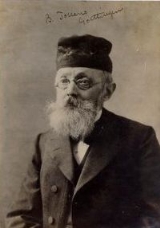
Bernhard Tollens
Encyclopedia
Bernhard Christian Gottfried Tollens (July 30, 1841 – January 31, 1918) was a German chemist.
in Hamburg
where he was influenced by his science teacher, Karl Möbius
. After graduating in 1857, Tollens started an apprenticeship in pharmacy. He finished in 1862 and began studying chemistry in Göttingen in Wöhler's
laboratory, then supervised by Friedrich Konrad Beilstein
and Rudolph Fittig. In 1864, Tollens submitted his thesis and received his PhD without a defense. The latter was possible through the intercession of Wöhler so that Tollens could accept and begin an attractive job at a bronze factory. However, Tollens left the job after only six months and joined the group of Emil Erlenmeyer at the University of Heidelberg for six months. He later worked with Charles-Adolphe Wurtz
in Paris
and, for 11 months, was chief of the chemical laboratory at the University of Coimbra in Portugal
.
Unable to resist the call of Wöhler, his former professor, Tollens returned to Göttingen in 1872 and there he remained in various positions until his death in 1918. It was during this final time in Göttingen that he started his work on carbohydrate
s, which yielded structures of several sugar
s, the Tollens reagent, and most of his publications.
Life and work
Tollens attended school at the Gelehrtenschule des JohanneumsGelehrtenschule des Johanneums
The Gelehrtenschule des Johanneums is a Gymnasium in Hamburg, Germany. It is Hamburg's oldest school and was founded in 1529 by Johannes Bugenhagen. The school's motto is The Future needs a Heritage...
in Hamburg
Hamburg
-History:The first historic name for the city was, according to Claudius Ptolemy's reports, Treva.But the city takes its modern name, Hamburg, from the first permanent building on the site, a castle whose construction was ordered by the Emperor Charlemagne in AD 808...
where he was influenced by his science teacher, Karl Möbius
Karl Möbius
Karl August Möbius was a German zoologist who was a pioneer in the field of ecology and a former director of the Museum für Naturkunde in Berlin.- Early life :...
. After graduating in 1857, Tollens started an apprenticeship in pharmacy. He finished in 1862 and began studying chemistry in Göttingen in Wöhler's
Friedrich Wöhler
Friedrich Wöhler was a German chemist, best known for his synthesis of urea, but also the first to isolate several chemical elements.-Biography:He was born in Eschersheim, which belonged to aau...
laboratory, then supervised by Friedrich Konrad Beilstein
Friedrich Konrad Beilstein
Friedrich Konrad Beilstein , Russian name "Бейльштейн, Фёдор Фёдорович", was a chemist and founder of the famous Handbuch der organischen Chemie . The first edition of this work, published in 1881, covered 1,500 compounds in 2,200 pages...
and Rudolph Fittig. In 1864, Tollens submitted his thesis and received his PhD without a defense. The latter was possible through the intercession of Wöhler so that Tollens could accept and begin an attractive job at a bronze factory. However, Tollens left the job after only six months and joined the group of Emil Erlenmeyer at the University of Heidelberg for six months. He later worked with Charles-Adolphe Wurtz
Charles-Adolphe Wurtz
Adolphe Wurtz was an Alsatian French chemist. He is best remembered for his decades-long advocacy for the atomic theory and for ideas about the structures of chemical compounds, against the skeptical opinions of chemists such as Marcellin Berthelot and Etienne Henri Sainte-Claire Deville...
in Paris
Paris
Paris is the capital and largest city in France, situated on the river Seine, in northern France, at the heart of the Île-de-France region...
and, for 11 months, was chief of the chemical laboratory at the University of Coimbra in Portugal
Portugal
Portugal , officially the Portuguese Republic is a country situated in southwestern Europe on the Iberian Peninsula. Portugal is the westernmost country of Europe, and is bordered by the Atlantic Ocean to the West and South and by Spain to the North and East. The Atlantic archipelagos of the...
.
Unable to resist the call of Wöhler, his former professor, Tollens returned to Göttingen in 1872 and there he remained in various positions until his death in 1918. It was during this final time in Göttingen that he started his work on carbohydrate
Carbohydrate
A carbohydrate is an organic compound with the empirical formula ; that is, consists only of carbon, hydrogen, and oxygen, with a hydrogen:oxygen atom ratio of 2:1 . However, there are exceptions to this. One common example would be deoxyribose, a component of DNA, which has the empirical...
s, which yielded structures of several sugar
Sugar
Sugar is a class of edible crystalline carbohydrates, mainly sucrose, lactose, and fructose, characterized by a sweet flavor.Sucrose in its refined form primarily comes from sugar cane and sugar beet...
s, the Tollens reagent, and most of his publications.

